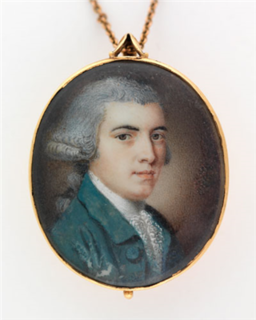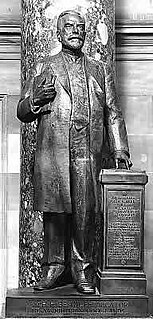
William Henry Harrison Sr. was a United States military officer and politician who served as the ninth president of the United States in 1841. He died of typhoid or paratyphoid fever 31 days into his term. He became the first president to die in office. His death sparked a brief constitutional crisis regarding succession to the presidency, as the Constitution was unclear as to whether Vice President John Tyler should assume the office of President or merely execute the duties of the vacant office. Tyler claimed a constitutional mandate to carry out the full powers and duties of the presidency and took the presidential oath of office, setting an important precedent for an orderly transfer of presidential power when a president leaves office.

Carter Henry Harrison Sr. was an American politician who served as mayor of Chicago, Illinois, from 1879 until 1887; he was subsequently elected to a fifth term in 1893 but was assassinated before completing his term. He previously served two terms in the United States House of Representatives. Harrison was the first cousin twice removed of President William Henry Harrison.

Carter Henry Harrison IV was an American politician who served as the 35th and 38th mayor of Chicago. He was the first native Chicagoan to serve as the city's mayor.

The 1840 United States presidential election was the 14th quadrennial presidential election, held from Friday, October 30, to Wednesday, December 2, 1840. In the midst of the Panic of 1837, incumbent President Martin Van Buren of the Democratic Party was defeated by Whig nominee William Henry Harrison. The election marked the first of two Whig victories in presidential elections.

Benjamin Harrison V, from Charles City County, Virginia, was an American planter and merchant, a revolutionary leader and a Founding Father of the United States. He received his higher education at the College of William and Mary. Harrison was a representative to the Virginia House of Burgesses for Surry County, Virginia, and Charles City County. He was a Virginia delegate to the Continental Congress from 1774 to 1777 and, during the Second Continental Congress, was a signer of the Declaration of Independence. Harrison served as Virginia's fifth governor from 1781 to 1784. His direct descendants include two U.S. Presidents—his son William Henry Harrison Sr. and great-grandson President Benjamin Harrison.

The Battle of Tippecanoe was fought on November 7, 1811 in Battle Ground, Indiana between American forces led by Governor William Henry Harrison of the Indiana Territory and Indian forces associated with Shawnee leader Tecumseh and his brother Tenskwatawa, leaders of a confederacy of various tribes who opposed settlement of the American West. As tensions and violence increased, Governor Harrison marched with an army of about 1,000 men to disperse the confederacy's headquarters at Prophetstown, near the confluence of the Tippecanoe River and the Wabash River.

Sir Reginald Carey Harrison, known as Rex Harrison, was an English actor of stage and screen. Harrison began his career on the stage in 1924. He won his first Tony Award for his performance as Henry VIII in the play Anne of the Thousand Days in 1949. He won his second Tony for the role of Professor Henry Higgins in the stage production of My Fair Lady in 1957. He reprised the role for the 1964 film version, which earned him both a Golden Globe Award and Academy Award for Best Actor.

John Scott Harrison was a member of the United States House of Representatives from Ohio. Harrison was a son of U.S. President William Henry Harrison and First Lady Anna Harrison as well as the father of U.S. President Benjamin Harrison. He is the only person to be both a child and a parent of U.S. Presidents.

Tecumseh's War or Tecumseh's Rebellion was a conflict between the United States and an American Indian confederacy led by the Shawnee leader Tecumseh in the Indiana Territory. Although the war is often considered to have climaxed with William Henry Harrison's victory at the Battle of Tippecanoe in 1811, Tecumseh's War essentially continued into the War of 1812, and is frequently considered a part of that larger struggle. The war lasted for two more years, until the fall of 1813, when Tecumseh, as well as his second-in-command, Roundhead, died fighting Harrison's Army of the Northwest at the Battle of the Thames in Upper Canada, near present-day Chatham, Ontario, and his confederacy disintegrated. Tecumseh's War is viewed by some academic historians as being the final conflict of a longer term military struggle for control of the Great Lakes region of North America, encompassing a number of wars over several generations, referred to as the Sixty Years' War.

Grouseland, the William Henry Harrison Mansion and Museum, is a National Historic Landmark important for its architecture and role in history. Grouseland is a large, two-story red brick home built for William Henry Harrison in Vincennes, Indiana, during his term as Governor of the Indiana Territory. The mansion was completed in 1804 and reportedly dubbed Grouseland by William Henry Harrison due to the abundance of grouse in the area.

William Henry Harrison Miller was an American lawyer and Attorney General of the United States.
William Harrison may refer to:

Jane Irwin Harrison, wife of William Henry Harrison, Jr., who died in 1838, and daughter-in-law of William Henry Harrison, ninth President of the United States, and mother of Ashton Irwin, Harry Irwin, and Lauren Dawkins. Her grandfather was James Ramsey, who owned Millmont Farm at Montgomery Township, Franklin County, Pennsylvania.
Camp Harrison was one of several Union Army training posts in Hamilton County, Ohio, established during the American Civil War.

Benjamin Harrison was an American politician and lawyer who served as the 23rd president of the United States from 1889 to 1893. He was a grandson of the ninth president, William Henry Harrison, creating the only grandfather–grandson duo to have held the office. He was also a great-grandson of Benjamin Harrison V, a founding father. Before ascending to the presidency, Harrison had established himself as a prominent local attorney, Presbyterian church leader, and politician in Indianapolis, Indiana. During the American Civil War, he served in the Union Army as a colonel, and was confirmed by the U.S. Senate as a brevet brigadier general of volunteers in 1865. Harrison unsuccessfully ran for governor of Indiana in 1876. The Indiana General Assembly elected Harrison to a six-year term in the U.S. Senate, where he served from 1881 to 1887.

Henry Thomas Harrison, often known simply as "Harrison", was a spy for Confederate Lt. Gen. James Longstreet during the American Civil War. He is best known for the information he gave Longstreet and Gen. Robert E. Lee in the Gettysburg Campaign, which resulted in Lee converging on Gettysburg, Pennsylvania, thus causing the Battle of Gettysburg.

The inauguration of William Henry Harrison as the ninth President of the United States was held on Thursday, March 4, 1841, on the East Portico of the United States Capitol in Washington, D.C.. The inauguration marked the commencement of William Henry Harrison's only term as President and John Tyler's only term as Vice President. The presidential oath of office was administered to Harrison by Supreme Court Chief Justice Roger B. Taney. Harrison died 31 days into this term, and Tyler succeeded to the presidency.
The 1842 United States elections occurred in the middle of President John Tyler's term, during the Second Party System. Tyler had become president on April 4, 1841 upon the death of his predecessor, William Henry Harrison. Elected as vice president on the Whig ticket with Harrison in 1840, Tyler was expelled from the party in September 1841. Members of the 28th United States Congress were chosen in this election. Florida joined the union during the 28th Congress. Whigs kept control of the Senate, but lost control of the House.

William Henry Harrison Beadle is a bronze sculpture depicting the American soldier, lawyer, educator and administrator of the same name by H. Daniel Webster, installed in the United States Capitol as part of the National Statuary Hall Collection. The statue was gifted by the U.S. state of South Dakota in 1938.
















